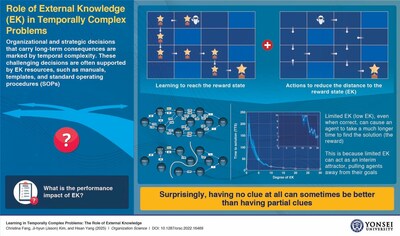Navigating the Knowledge Paradox: Why Having Some Answers can be Worse Than Having None by Yonsei University
PR Newswire
SEOUL, South Korea, Sept. 15, 2025
Researchers demonstrate that limited external knowledge can prove to be deleterious when dealing with complex problems
SEOUL, South Korea, Sept. 15, 2025 /PRNewswire/ -- Chess is a strategic game characterized by temporal complexity—wherein the goodness of a move is unclear due to a separation between action and outcome. Likewise, many organizational decisions do not yield instant consequences, leading to temporally complex problems. Decision makers tackle such challenges through internal as well as external information. Unfortunately, while many strategic and organizational decisions are expected to have longer-term consequences, existing behavioral models of learning have barely explored hard or complex problems so far.
In an innovative study, an international team of researchers, including Professor Ji-hyun Kim from Yonsei University, South Korea; Professor Christina Fang from NYU Stern, USA; and Assistant Professor Hisan Yang from Louisiana State University, USA, have computationally explored the role of external knowledge in tackling temporally complex problems.
Their findings were published online in Articles in Advance section of the journal Organization Science on 10 April 2025.
According to Prof. Kim, "Our key point is the counterintuitive finding that limited external knowledge can actually impair performance more than having no external knowledge at all in temporally complex problem-solving environments."
This study demonstrates that while a high level of external knowledge, such as rules, templates, or guidance from outside the organization, generally improves performance, its benefits are nonmonotonic. When external knowledge is incomplete or only available for a subset of possible states or actions, it creates "interim attractors"—subgoals that decision makers learn to value. As a result, agents may overvalue actions that lead to these subgoals—states with external knowledge—rather than those that more directly advance toward the ultimate goal. This effect is especially pronounced in environments where feedback is delayed and actions have long-term consequences owing to temporal complexity, as is common in strategic and organizational decision-making.
"The BlackBerry Storm case by Research in Motion (RIM) highlights a scenario where external knowledge on the need for a touchscreen smartphone was correctly identified, but its application—combined with limited internal experience—led to a flawed product and market failure. In our paper, we further discuss how Merck, Sanofi, and GSK relied on their existing external knowledge on vaccine platforms for COVID-19, but these approaches turned out to be dead ends, causing them to abandon their vaccine efforts despite prior success with other viruses," highlights Prof. Kim.
In light of these and many more such examples, the present findings are expected to have numerous real-life applications in the areas of drug development processes in pharmaceutical firms, strategic decision-making in technology companies, vaccine development in response to health crises, and organizational learning and adaptation.
In this way, this work on learning in temporally complex problems and the interplay between external and internal knowledge has significant and far-reaching implications for organizations, individuals, and society over the next five to ten years. These include better management of complex projects and improved innovation and performance in the domain of organizational decision-making and strategy, curriculum design and lifelong learning culture in the field of education and training, policy implementation and healthcare innovation in regard to public policy and healthcare, digital transformation and AI and decision support systems in the field of technology and AI integration, as well as career resilience and innovation and entrepreneurship with respect to individual career development.
Reference
Title of | Learning in Temporally Complex Problems: The Role of External |
Journal: | Organization Science |
DOI: |
About Yonsei University
https://www.yonsei.ac.kr/en_sc/
Media Contact:
Jin Young Choi
82-2- 2123-2079
401101@email4pr.com
![]() View original content to download multimedia:https://www.prnewswire.com/news-releases/navigating-the-knowledge-paradox-why-having-some-answers-can-be-worse-than-having-none-by-yonsei-university-302555620.html
View original content to download multimedia:https://www.prnewswire.com/news-releases/navigating-the-knowledge-paradox-why-having-some-answers-can-be-worse-than-having-none-by-yonsei-university-302555620.html
SOURCE Yonsei University



